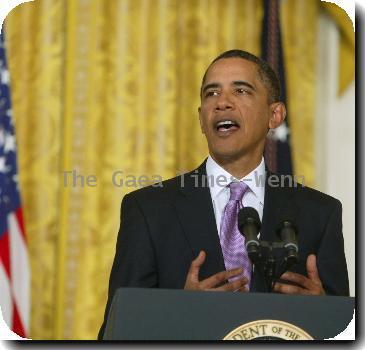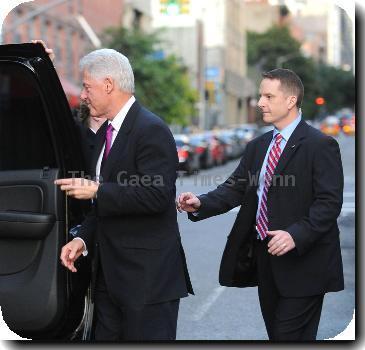Obama jumps into Massachusetts fray to resuce Democratic Senate candidate, health care plan
By Liz Sidoti, APFriday, January 15, 2010
Health bill at stake, Obama to stump in Bay State
BOSTON — His health care plan in peril, President Barack Obama laid on a last-minute campaign trip to Massachusetts for Democrat Martha Coakley on Sunday with polls showing her struggling in an unexpectedly close race against Republican Scott Brown to fill the late Edward M. Kennedy’s Senate seat.
Vice President Joe Biden, trying to turn the focus of the race away from the president’s embattled health care bill, joined the fray, sending an e-mail to Democrats assailing the Republican candidate for opposing Obama’s just-announced plan to tax large Wall Street firms.
The late-game White House aggressiveness reflected a sudden deep concern among Democrats that they could lose a seat the party has controlled for more than half a century — and with it the 60th Senate vote that is all that has kept alive the health care overhaul that Obama has spent his entire first year pushing toward passage.
Beyond that, a poor outcome for Coakley on Tuesday would make moderate Democrats ever more nervous about backing Obama on other issues out of concern about their own re-election chances in November, undercutting his presidency just as he’s beginning his second year.
On defense and on the attack, Coakley made the same argument as Biden Friday as she tried to appeal to an anti-government, pro-populism electorate. “I’m standing with Main Street on this one. Scott Brown stands with Wall Street,” she said.
Brown countered at a campaign event later: “There’s only one candidate in this race who’s a tax cutter — and it’s not Martha Coakley.”
Democrats control 60 votes in the Senate, enough to thwart a Republican filibuster of Obama’s near-complete health care plan. If Coakley wins, she has said, she will vote, as Kennedy did, with the 57 other Democrats and two independents who side with them. Brown has made clear he would vote against the health plan, which all other Republicans oppose, giving Senate Republicans the 41st vote they need to block the legislation.
“If Scott Brown wins, it’ll kill the health bill,” said Rep. Barney Frank, D-Mass.
Secretary of State William F. Galvin, Massachusetts’ top election official, said certifying Tuesday’s results could take more than two weeks, maybe enough time for Democrats to push Obama’s signature legislation through Congress before Brown could take office. Sen. Paul G. Kirk Jr., the interim appointee to Kennedy’s seat, says he will vote for the bill if given the chance.
Reversing course from earlier in the week, the White House hastily arranged Obama’s trip to campaign with Coakley — even as Democratic leaders in Congress struggled along with the president to nail down a deal on the historic legislation overhauling the country’s system of medical care.
Until now, Obama’s involvement in the Massachusetts race has been limited to taping an online video and automated phone messages asking Bay Staters to vote for Coakley. “She’ll be your voice and my ally,” the president promised.
What changed from earlier in the week when the White House announced that the president wouldn’t travel to Massachusetts? “He got invited,” said White House Press Secretary Robert Gibbs.
That invitation, Gibbs said, came Friday, one day after a Suffolk University survey signaled a possible death knell for the 60-vote Senate supermajority the president has been relying upon to pass his health care bill and other initiatives through Congress before November’s midterm elections
The poll showed Brown, a Republican state senator, with 50 percent of the vote. Coakley had 46 percent. That amounted to a statistical tie since it was within the poll’s 4.4 percentage point margin of error, far different from the 15-point lead that Coakley, the Massachusetts attorney general, enjoyed in a Boston Globe survey released last weekend.
Private, internal polling for both Republicans and Democrats showed a tight race, as well. Momentum was clearly on Brown’s side following a final debate in which he was widely seen as beating Coakley on Monday.
The Suffolk University survey showed that Brown backers include some disaffected Democrats. It also showed similarities between his supporters and the Republicans and independents who shaped recent GOP victories in the Virginia and New Jersey gubernatorial races last fall. The supporters are showing a high degree of enthusiasm for their candidate, a relative unknown who has never run statewide, while Democrats have shown little passion for Coakley although she cruised in the four-way Democratic primary with nearly 50 percent of the vote.
The election comes the day after the three-day Martin Luther King Jr. holiday weekend — and on the last day of Obama’s first year in office. Snow is forecast for Monday, and many locals head south for warmer weather or north to go skiing during the shortened workweek.
On Friday, Republican and Democratic heavyweights campaigned for both candidates.
At a rally in Boston’s North End, former New York Mayor Rudolph Giuliani urged voters to elect Brown for his anti-terror credentials.
“His election, I believe will send a signal — and a very dramatic one — that we’re going in the wrong direction on terrorism,” said Giuliani, who opposes the administration’s decision to have the trial of Sept. 11 terror suspects in New York City.
Former President Bill Clinton was making two appearances in Massachusetts despite his duties as a special envoy to earthquake-ravaged Haiti, another sign of the stakes. “You just have to decide if you want to pick the person who gets to shut America down,” Clinton told voters at one stop.
Sen. John Kerry, recovering from hip replacement surgery, took the stage at one event with the help of Kennedy’s cane. And Kennedy’s widow, Vicki Kennedy, planned to join Coakley at her first canvassing event in Boston on Saturday.
Kennedy, who died Aug. 25 of brain cancer, also was elected to the Senate in a special election on Nov. 6, 1962. He took office the next day, Nov. 7. It was the seat his brother, John F. Kennedy, vacated when he became president in 1961. The Democrats have held the seat since JFK was elected in 1952.
Liz Sidoti reported from Washington. Associated Press writers Julie Pace and Alan Fram contributed to this report.
Tags: Barack Obama, Bill Clinton, Boston, District Of Columbia, Government Regulations, Haiti, Health Care Reform, Industry Regulation, John Kerry, Massachusetts, North America, Political Issues, Political Organizations, Political Parties, Senate Elections, United States










